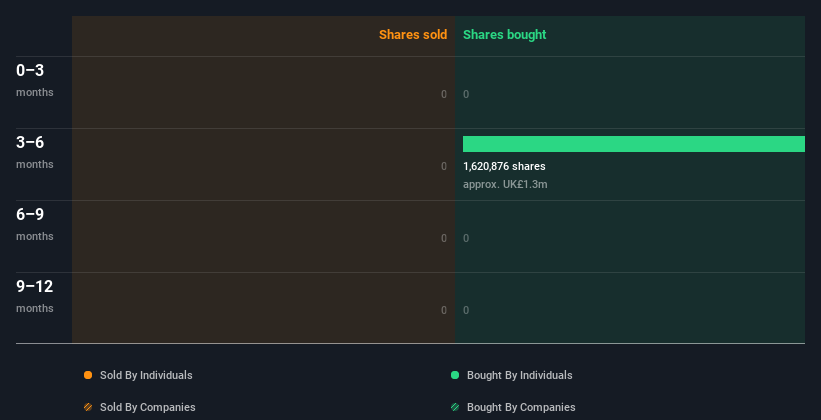Shoe Zone plc (LON:SHOE) insiders placed bullish bets worth UK£1.3m in the last 12 months
In the last year, multiple insiders have substantially increased their holdings of Shoe Zone plc (LON:SHOE) stock, indicating that insiders' optimism about the company's prospects has increased.
While insider transactions are not the most important thing when it comes to long-term investing, logic dictates you should pay some attention to whether insiders are buying or selling shares.
View our latest analysis for Shoe Zone
Shoe Zone Insider Transactions Over The Last Year
In the last twelve months, the biggest single purchase by an insider was when CEO & Executive Director Anthony Edward Smith bought UK£721k worth of shares at a price of UK£0.80 per share. That means that even when the share price was higher than UK£0.72 (the recent price), an insider wanted to purchase shares. While their view may have changed since the purchase was made, this does at least suggest they have had confidence in the company's future. We always take careful note of the price insiders pay when purchasing shares. It is generally more encouraging if they paid above the current price, as it suggests they saw value, even at higher levels.
In the last twelve months Shoe Zone insiders were buying shares, but not selling. You can see the insider transactions (by companies and individuals) over the last year depicted in the chart below. If you click on the chart, you can see all the individual transactions, including the share price, individual, and the date!
There are always plenty of stocks that insiders are buying. So if that suits your style you could check each stock one by one or you could take a look at this free list of companies. (Hint: insiders have been buying them).
Insider Ownership of Shoe Zone
Looking at the total insider shareholdings in a company can help to inform your view of whether they are well aligned with common shareholders. A high insider ownership often makes company leadership more mindful of shareholder interests. Shoe Zone insiders own about UK£19m worth of shares (which is 54% of the company). I like to see this level of insider ownership, because it increases the chances that management are thinking about the best interests of shareholders.
What Might The Insider Transactions At Shoe Zone Tell Us?
The fact that there have been no Shoe Zone insider transactions recently certainly doesn't bother us. On a brighter note, the transactions over the last year are encouraging. Judging from their transactions, and high insider ownership, Shoe Zone insiders feel good about the company's future. So while it's helpful to know what insiders are doing in terms of buying or selling, it's also helpful to know the risks that a particular company is facing. For instance, we've identified 3 warning signs for Shoe Zone (1 is potentially serious) you should be aware of.
Of course, you might find a fantastic investment by looking elsewhere. So take a peek at this free list of interesting companies.
For the purposes of this article, insiders are those individuals who report their transactions to the relevant regulatory body. We currently account for open market transactions and private dispositions, but not derivative transactions.
This article by Simply Wall St is general in nature. We provide commentary based on historical data and analyst forecasts only using an unbiased methodology and our articles are not intended to be financial advice. It does not constitute a recommendation to buy or sell any stock, and does not take account of your objectives, or your financial situation. We aim to bring you long-term focused analysis driven by fundamental data. Note that our analysis may not factor in the latest price-sensitive company announcements or qualitative material. Simply Wall St has no position in any stocks mentioned.
Have feedback on this article? Concerned about the content? Get in touch with us directly. Alternatively, email editorial-team (at) simplywallst.com.

 Yahoo Finance
Yahoo Finance 
